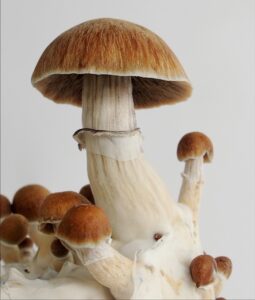
Summary of research paper by Orozco and Harris, published in the Journal of the Anthropology of Consciousness, on August 14, 2022.
The paper “Psilocybin and the Meaning Response: Exploring the Healing Process in a Retreat Setting in Jamaica” examines the therapeutic effects of psilocybin, the active compound found in “magic mushrooms,” in a retreat setting in Jamaica. The study seeks to understand the underlying processes that contribute to the healing and transformative experiences reported by individuals who have undergone psilocybin-assisted therapy.
Psilocybin has shown promise as a treatment for various mental health disorders, including depression, anxiety, and post-traumatic stress disorder. Researchers have hypothesized that one possible mechanism by which psilocybin may exert its therapeutic effects is through the “meaning response,” which refers to the subjective experience of meaning or significance in response to a therapeutic intervention. This paper investigates the meaning response in the context of psilocybin-assisted therapy and its potential role in the healing process.
The study was conducted in a retreat setting in Jamaica, where psilocybin use is not restricted by law. Participants were recruited from individuals who had enrolled in a one-week psilocybin retreat. The retreat involved group sessions, individual therapy sessions, and two psilocybin sessions, with each participant receiving a dose of psilocybin according to their body weight.
A mixed-methods approach was used to collect data, including qualitative interviews, self-report questionnaires, and physiological measures. The interviews were designed to elicit participants’ subjective experiences and perceptions of the healing process, while questionnaires assessed psychological well-being, personality traits, and other relevant factors. Physiological measures, such as heart rate variability and cortisol levels, were used as objective markers of stress and relaxation.
The results of the study suggest that psilocybin-assisted therapy in a retreat setting can facilitate profound experiences of meaning and personal transformation. Participants reported improvements in mental health, increased psychological flexibility, and a greater sense of well-being following the retreat. Many participants attributed these changes to their experiences with psilocybin, which often involved intense emotional release, feelings of connectedness, and insights into personal issues.
The paper proposes a model to explain the healing process, which involves three interrelated components: set, setting, and substance. “Set” refers to the individual’s mindset and expectations, “setting” denotes the therapeutic environment, and “substance” involves the pharmacological properties of psilocybin. The authors argue that the meaning response arises from the interaction of these three components, with the retreat setting playing a crucial role in fostering a supportive, nurturing environment that encourages personal growth and self-reflection.
In conclusion, the paper highlights the potential of psilocybin-assisted therapy in a retreat setting to facilitate transformative experiences and promote mental health. The findings suggest that the meaning response may be a critical factor in the healing process, as it allows individuals to derive a sense of meaning and purpose from their experiences. Further research is needed to better understand the underlying mechanisms of the meaning response and to explore the therapeutic potential of psilocybin in other populations and contexts.







